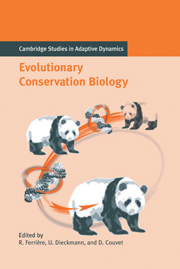Book contents
- Frontmatter
- Contents
- Contributing Authors
- Acknowledgments
- Notational Standards
- 1 Introduction
- Part A Theory of Extinction
- Part B The Pace of Adaptive Responses to Environmental Change
- 5 Responses to Environmental Change: Adaptation or Extinction
- 6 Empirical Evidence for Rapid Evolution
- 7 Genetic Variability and Life-history Evolution
- 8 Environmental Stress and Quantitative Genetic Variation
- Part C Genetic and Ecological Bases of Adaptive Responses
- Part D Spatial Structure
- Part E Community Structure
- References
- Index
- The International Institute for Applied Systems Analysis
6 - Empirical Evidence for Rapid Evolution
Published online by Cambridge University Press: 15 August 2009
- Frontmatter
- Contents
- Contributing Authors
- Acknowledgments
- Notational Standards
- 1 Introduction
- Part A Theory of Extinction
- Part B The Pace of Adaptive Responses to Environmental Change
- 5 Responses to Environmental Change: Adaptation or Extinction
- 6 Empirical Evidence for Rapid Evolution
- 7 Genetic Variability and Life-history Evolution
- 8 Environmental Stress and Quantitative Genetic Variation
- Part C Genetic and Ecological Bases of Adaptive Responses
- Part D Spatial Structure
- Part E Community Structure
- References
- Index
- The International Institute for Applied Systems Analysis
Summary
Introduction
All organisms have the capacity to evolve in the face of a changing environment. Our general goal is to learn about the limitations to this process of evolution. How quickly can organisms evolve? How much change is possible? Can this capacity for change be predicted from factors like the genetic variation present within the population or the structure and demography of the population? Such issues are clearly of importance in the context of conservation biology, because species can be endangered by a changing environment and their limited capacity to evolve in response to that change.
Our first goal is to describe the process of adaptation in natural populations of guppies, and then generalize this approach to other organisms. We begin with guppies because it has been possible to study their evolution from an experimental perspective in natural populations. They therefore provide an empirical example of the process of evolution by natural selection and, in this single special case, characterize the limitations to this process. The first perspective is to describe how guppy life histories differ between localities in terms of the predators that they co-occur with. The second perspective is to use duplicated experimental episodes of directional selection to characterize the process of natural selection in real populations. We then use the results of these and other studies of rapid evolution to describe some of the limitations to evolution by natural selection and to characterize the circumstances under which rapid evolution has been seen to occur.
- Type
- Chapter
- Information
- Evolutionary Conservation Biology , pp. 101 - 118Publisher: Cambridge University PressPrint publication year: 2004
- 20
- Cited by

